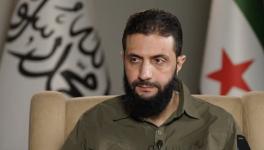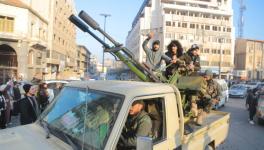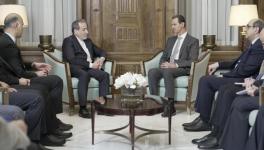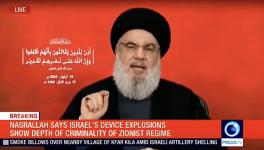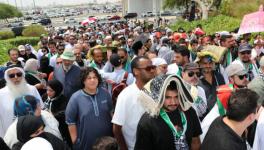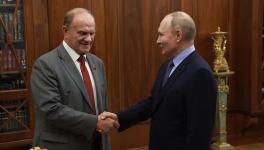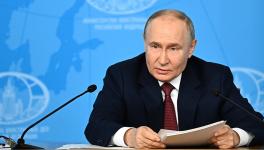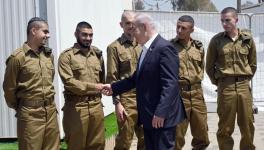Opening Borders to Extremists Comes Back to Haunt Turkey
Vijay Prashad is the George and Martha Kellner Chair in South Asian History and Professor of International Studies at Trinity College. He is the author of twenty books, including The Death of the Nation and the Future of the Arab Revolution (LeftWord and University of California Press, 2016) and co-editor of Land of Blue Helmets: The UN in the Arab World (University of California Press, 2016) as well as editor of Letters to Palestine: Writers Respond to War and Occupation. Vijay is the Chief Editor of LeftWord Books (leftword.com) and is a columnist for Frontline and AlterNet as well as a frequent contributor to The Hindu, Himal and Counterpunch.
Transcript
Sharmini Peries: Welcome to The Real News Network. I'm Sharmini Peries, coming to you from Baltimore.
Following the Reina nightclub shooting in Istanbul, Turkey, Turkish officials are saying they have killed at least 18 ISIS militants in Syria. ISIS did claim responsibility for the attack, but the actual identity of the attacker and his affiliations are still unknown. Chief of the Turkish General Staff said to its state news agency Anadolu, that they attacked a hundred jihadist targets in Syria immediately after the nightclub attack.
Those killed in the nightclub, included citizens from Jordan, Israel, Iraq, Kuwait, Saudi Arabia and Turkey. At least 39 people were killed, and 70 wounded, when a shooter stormed the nightclub in the early morning hours of 2017, throwing explosives and shooting people with automatic rifle.
Joining us to discuss the mayhem in Turkey is Vijay Prashad. Vijay is the George and Martha Kellner Chair in South Asian History, and Professor of International Studies at Trinity College. His latest book is titled, "The Death of The Nation and the Future of the Arab Revolution"
Good to have you back with us Vijay.
Vijay Prashad: Thanks a lot.
Sharmini Peries: So, Vijay, 2016 had been a violent and bloody year for Turkey. Would you put this particular attack in its wider context, of the many attacks that Turkey has experienced this year?
Vijay Prashad: Well, sadly for Turkey the difference between 2016 and 2017 might end up being very little. There was an attack in Turkey on the 11th of December 2016, there was an attack then on New Year's Eve, and there was an attack, an explosion in Izmir that followed. These attacks, or at least this cycle of attacks in Turkey, began perhaps in the middle of 2015, when there was an attack in Ankara that was linked to the Islamic state. In other words, Islamic state first claimed responsibility for that attack in Ankara, in the middle of 2015.
Since that attack in Ankara in 2015, at very punctual intervals, the Islamic state has struck inside Turkey. And there is, of course, a very straightforward reason why the Islamic state is striking Turkey and why increasingly, I think, we're going to see other extremist groups, not affiliated with Islamic state striking in Turkey. And that has to do with the fact that Turkey, which had before 2015, been quite liberal with its border, allowing extremists to go across. In fact, not just liberal with its border, but directly providing material support to some extremist groups, mainly in western Syria.
Therefore, those extremist groups were able to seize a substantial part of Aleppo and Idlib, and other parts of northwestern Syria. So, when Turkey, after around 2015, began to tighten up its border and eventually slow down on its support to these proxy groups, they began to turn on Turkey and attack it.
So, this particular attack on New Year's, the attack on the 11th of December -- this is part of a sequence of attacks for Turkey having first basically primed the pump of extremism in Syria, and then tried to slow that pump down.
Sharmini Peries: Vijay, the Syrian war has complicated matters for Turkey. They were already dealing with bomb attacks and suicide detonations internally, due to the Kurdish question. How much of these attacks that we are seeing, is a blowback as a result of Turkey's policies on the war in Syria, and the new alliances with Russia, Iran and the Assad government?
Vijay Prashad: Well, you know, I think Turkey had to make a rational calculation at some point last year. There's been a great deal of instability inside the country. The government of the AKP party had, when it first came to power, understood, this is before the Syrian civil war; the conflict broke out in Syria. The government of the AKP understood that it needed to settle the long-standing, and very dangerous, conflict that had been inside Turkey, that is, with regard to the Kurdish population.
So, a very important peace deal, or process, had opened up, called the Imrali Process, which had the Kurdish Workers Party on one side, and the Turkish government on the other. And they had begun to make some very serious progress towards ending the war, between the Turkish state and the PKK. And, of course, with this Syrian conflict and with Turkey's advanced position inside Syria, with the growth of a Kurdish-Syrian enclave of so-called, Rojava, in northern Syria, Turkey's own policies went into a contradiction.
On the one side, it was very eager to see the fall of the government of Bashar-al-Assad, and putting in place the Syrian Muslim Brotherhood, very closely aligned with the government in Turkey. So, that was one, as it were, side of the equation. On the other side of the equation, the contradictions of trying to overthrow Bashar-al-Assad increased the aspirations of the Kurds.
So, on the one side where the AKP saw themselves being able to tackle, which was the Kurdish question, was opened up in a much more brutal and vicious way, that when these contradictions of trying to overthrow Bashar-al-Assad, became clear. So, what you get in this period now, is you get a Turkey which has basically inflamed, not only by the extremists, that it has basically produced through its support of some currents inside the Syrian conflict. But also it has opened up the civil war with the Kurds.
So, there have been these bomb blasts where ISIS has taken responsibility. But there have also been very serious attacks from splinter groups of the PKK against the Turkish state. At the same time as the Turkish state has been very violent against Kurdish areas in the southeastern part of the country. So, there is a kind of strange asymmetry involved here. Where on the one side the Turkish state under this government had intended to create peace with the Kurds. On the other side, as it opened up its support to overthrow Bashar-al-Assad, that peace deal fell apart and then the Turkish state became prey. Not to one problem, but to two.
And that's where Turkey is right now, and that is why it has decided, quite rationally, to seek some rapprochement with the Russians. To seek some rapprochement with the Iranians, to try to settle the Syrian problem, because the Syrian problem has been the cause of the destabilizing of Turkey, which, you know, if this rapprochement hadn't happened, might have gone basically out of control.
Sharmini Peries: Vijay, in the past, the U.S., through Europe and other allies, was able to dangle membership of NATO or membership in the European Union over Turkey's head in order to get it to submit to U.S. policies in the region. But, since the attempted coup against Erdogan, he doesn't seem to be constrained by these factors. Explain these shifts that are taking place.
Vijay Prashad: Well, it's very interesting that every time there's been an assault inside Turkey, whether it's been the attempted coup during last summer, the assassination of the Russian ambassador, or even this shooting, this attack on the Reina nightclub on New Year's Eve. At each of these moments -- occurrence inside the political party that's in power the AKP party -- have openly suggested that the United States is involved.
In fact, the Turkish government has been so annoyed with the United States, that they are saying that perhaps the United States should not be allowed to use the air base that the U.S. has used during the Cold War and now to bomb ISIS.
So, there has been a great deal of tension between the United States and Turkey. Some of this tension has been manifest around the body of a man who lives in Pennsylvania, and that is Mr. Gülen. Who at one time was a very close ally of the current government in Turkey. But they have since fallen out, and now the Turkish government sees the Gülen movement, and the Gülenists as behind all these coups, and that Gülenists as the proxies of the United States.
So, there has been a rift between the United States and Turkey. But let's not exaggerate this rift, because at the same time as there are these kind of public complaints and disagreements, military cooperation between the United States, NATO and Turkey is maintained. And I don't think this is going to be able to break very easily. I think Turkey sees itself now, as the interlocutor with Russia and Iran, it doesn't feel the need to break with the West completely.
So, it will try to play some kind of balancing game. I mean, how far the government in Ankara is going to be able to balance between these various internal and regional conflicts, and this big global struggle between the United States and Russia, that's hard to say. But I don't think there's going to be any dramatic break with the United States and NATO.
Sharmini Peries: Right. And then, finally, Vijay, today the Russians announced that they are having a partial withdrawal from Syria. In fact, they have withdrawn some forces and one of their main military vessels that was supporting the Syrian Assad government, in order to fight the rebels. What does all this mean?
Vijay Prashad: Well, this is the second time that the Russians have withdrawn some of their troops from Syria. It is of course significant, and the significance is, I think, less in military terms and more in political terms. You know, on the 30th of December, the Turks, Iranians, Russians and Syrians, with the Syrian opposition or sections of the Syrian opposition, basically created a ceasefire process.
Now, this process has not been doing very well. Largely because the Syrian Arab Army, or the government's army, is in a position of some dominance and they want to clean out rebel control. On the other side, rebel groups have been using techniques to try to punish the Syrian government, such as poisoning the water supply to Damascus.
So, the ceasefire hasn't entirely helped. But it's there in place and there's a process. Process is very important. Ceasefires are not a yes or no kind of question. It's a process. So, the process is in place. This process was to lead to a kind of peace, or at least a further ceasefire conversation in Astana, in Kazakhstan, where the Turks, the Iranians, the Russians, Syrian government, sections of the Syrian opposition and the United Nations are going to have a meeting that will start on January 23rd.
So, it's my view that the Russians have made this announcement now, in preparation to build confidence for the Astana meeting, in other words, to remove from the table the suggestion that one of the negotiating pieces for the opposition would be Russian withdrawal. So, by saying, "We've already withdrawn, or partially withdrawn, or started to withdraw from Syria." I think they want to take that off the table.
So, it's a negotiating question, this is the political question, this should not be understood as a military step.
Sharmini Peries: Right. And I have to ask you this question, Vijay. There's been a lot of controversy, and we talked about this the last time we spoke as well, in terms of the misinformation, disinformation, the social media coverage of the conflict in Syria and so forth. That there's been a lot of presentations, counter presentations, even at that U.N. level, on this matter.
Give us your take on how the Western media is covering, of course, what's happening in Turkey. As well as what's happening in Syria. And what are the objectives, or motivations, behind it might be. Because they are being attacked by some journalists that were on the ground, at some point or another, as being agents of regime change, which is the U.S. mission for Syria.
Vijay Prashad: Well, you know, let's face it, that most Western journalists or journalists who work for Western houses, have a certain ideological predisposition. One of the pieces of that ideology is that they, to some extent, different -- varies by degree -- they generally assume that the United States and Western countries have benevolent motives. I think that's some ideological view shared by many of these journalists.
I think, on the other side of it, because they have had the experiences of having minders watch them in these countries, etcetera; they have an antipathy to the one-party governments in this region, and in other parts of the world. And for good reason, I mean, nobody wants to have a minder shadow you around, etcetera. But this colors their perception of the conflict. And I think this is something to pay attention to.
For the editors of these houses, or the television channels, I think there it's much clearer. They believe in the American project. They were not willing to be critical of the United States in the lead-up to the war in Iraq. The coverage on U.S. atrocities in Iraq was basically non-existent, at the editorial level.
So, let's face it, the newspapers and the television channels are basically American Firsters. I think the journalists have a little more complicated position, because they often go and spend a great deal of time in these regions. I think during conflicts, there's a little dishonesty that creeps in. During the Syrian conflict in particular, Western journalists, if they entered Syria, largely went into government-held areas. They were often afraid to go the extremist-held areas, for good reason. I mean, I've had friends who went into these areas, people like Jim Foley, and they ended up being killed.
So, it was very dangerous to go to those areas, but they didn't report that. They reported that they were inside Syria and they reported having minders. But what is that compared to what it would have been like had they been on the other side, where they were often kidnapped, etcetera? So, I think there needs to be some soul-searching on that front.
And two more very quick things: one is the reliance on social media. I think that needs to be thought about very seriously. You know, there are good journalists who watch YouTube videos and write their stories based on what they've been sent, often by, you know, combatants in the conflict. And based their entire approach through the eyes of a combatant. You know, John Berger just died at the age of 90. I think it's a good idea for journalists to go back and read Berger's writings, if nothing else perhaps, "Ways of Seeing" and to see how this kind of imagery that's being fed to us, colors the narrative.
And, very quickly, finally, in terms of what we do with information we have. I think, again, here some soul-searching is necessary. There was a John Kerry tape where he was talking to some opposition figures and this was written about by the Western media last year, who had access to this tape. But when the tape was finally leaked, when the whole thing was revealed, very important pieces of what Kerry was saying was not reported. For instance, when he was saying that the United States knew that ISIS was germinating inside Syria, but they hoped to use the existence of ISIS as a bargaining chip against Damascus.
I mean, one would have thought that this should have been brought out in September 2016, when these newspapers were writing about the Kerry tape. But since they were the only ones that had it, they were able to so-called, massage the tape in ways that were useful for their ideology. So, I think there needs be some soul-searching. I'd like to see senior journalists come in and empanel some kind of commission to look seriously at the reporting on the Syria war.
Sharmini Peries: Brilliant, as always. Thank you so much, Vijay, for joining us, and that reference to the tapes is a tape that was released by WikiLeaks recently. We'll put a link to it below us. Thank you so much for joining us, Vijay.
Vijay Prashad: Thanks a lot.
Sharmini Peries: And thank you for joining us on The Real News Network.
-------------------------
END
Get the latest reports & analysis with people's perspective on Protests, movements & deep analytical videos, discussions of the current affairs in your Telegram app. Subscribe to NewsClick's Telegram channel & get Real-Time updates on stories, as they get published on our website.









